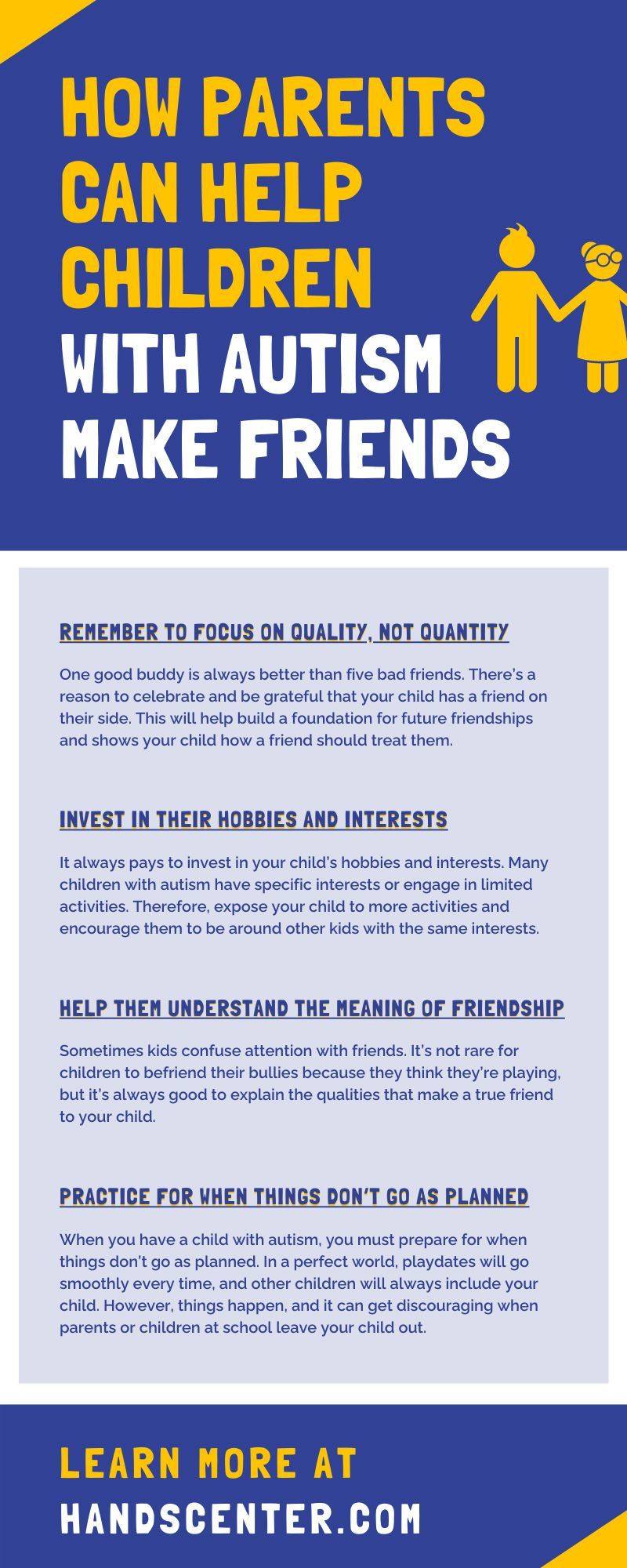How Parents Can Help Children With Autism Make Friends
Many parents who have children with autism have expressed concerns about their children making friends. We don’t want our children to feel alone or left out, and if we could give them all the friends in the world, we would. However, that’s not how the world works. Creating a game plan to encourage socialization in your child is essential for their future.
Friendships play a significant role in your overall well-being and quality of life. To ensure that your child finds their lifelong pal, here’s how parents can help children with autism make friends.
Remember To Focus on Quality, Not Quantity
One good buddy is always better than five bad friends. There’s a reason to celebrate and be grateful that your child has a friend on their side. This will help build a foundation for future friendships and shows your child how a friend should treat them. Remember that the end goal is the ensure that your child is happy and if that means they’re content with one or two friends, so be it.
Invest in Their Hobbies and Interests
It always pays to invest in your child’s hobbies and interests. Many children with autism have specific interests or engage in limited activities. Therefore, expose your child to more activities and encourage them to be around other kids with the same interests. Take the time to search for local clubs or meetings where children can all play their favorite games together.
While building on their hobbies, try introducing your child to newer activities. Exposure is key to developing new interests, and you can do this simultaneously. For example, you can tell your child that they can read their favorite books about the solar system after they go outside and play soccer for 10 minutes.
Help Them Understand the Meaning of Friendship
Sometimes kids confuse attention with friends. It’s not rare for children to befriend their bullies because they think they’re playing, but it’s always good to explain the qualities that make a true friend to your child. Ask your child questions like “do you like it when people play nice games with you?” and explain what bullying or negative behaviors look like. Be as clear and literal as possible, like “friends say nice things to you and make you feel better when you’re sad.”
It would be best if you also taught them how to be good friends with others. While playing, exhibit positive behaviors and say, “when your friend is having a bad day, ask if they’re okay or give them a hug.”
Practice for When Things Don’t Go As Planned
When you have a child with autism, you must prepare for when things don’t go as planned. In a perfect world, playdates will go smoothly every time, and other children will always include your child. However, things happen, and it can get discouraging when parents or children at school leave your child out. But don’t let this stop you and your child from making pals! Keep inviting friends from school over without expecting to get invited to theirs.
Bonus Tip: It’s always best to prepare your child for when someone isn’t exhibiting positive behaviors. You can troubleshoot these issues by practicing scenarios and showing your child how they can have fun by themselves or ask someone else if they want to play.
Practice Their Social Skills
When it comes to making friends, it takes time and some form of socialization. This is your child’s time to shine! Before heading on a playdate, you and your child can practice their social skills a few days before. This will help them feel more comfortable making friends and overcoming their struggles. Here are some things you all can practice before the big date:
- How to initiate a conversation
- Taking turns talking
- Understanding how to be flexible
- Understanding social cues
- Talking about more than specific interests
Invite Classmates for Playdates
The best way parents can help children with autism make friends is by planning playdates. However, as parents, it’s important to remember to separate your and your child’s idea of the perfect friends. Allow your child to choose their little buddies because they most likely have the same interests and hobbies.
Most children feel more relaxed hanging out in their home environment, allowing them to focus on social interaction and practice their skills. Try to plan activities that will encourage conversations and collaborative play.
Nonetheless, taking the kiddos to an arcade or the park doesn't hurt. Taking your child and their friends out for a day of play can help them be more comfortable going to various environments and could blossom a new interest.
Play Games That Stimulate Conversation
Many children with autism may feel safer and more comfortable playing video games. Although technology is full of wonders, you should encourage your child to play outside the computer or tablet. Playing games that stimulate conversation will help your child master taking turns and being socially aware.
Games you, your child, and a couple of friends can play are:
- The Name Game
- What would you do if….
- Tag
- Hide and seek
- Hopscotch
- Simon Says
- Candyland
- Go Fish
- I declare war
While some children are nonverbal, others can talk about their interests all day. It’s always a treat to hear your children talk about something excitedly, but this can cause social conflict since someone else may not get a chance to share their ideas. Some games help teach our children when it’s appropriate to join a conversation and how to stay on topic within a conversation.
Positive Reinforcement Is Key
Don’t forget to encourage your child and mention any positive social behaviors they exhibited. Remind them of the positive behaviors they should show to others when sharing toys, playing a game, or talking to someone. For example, if you see your child allowing someone else to use the game, you should say, “that’s nice of you for sharing with your friends! Good job!”
This will help them continue using positive behaviors while boosting their self-esteem and confidence for making more friends or having the courage to play with others.
Remember To Have Fun
Making friends and interacting with other kids should be a positive experience—it shouldn’t feel like a chore. Watching your child learn and grow can be an emotional but sweet feeling. Making these playdates, practices, club meetings, and activities more engaging and fun will make your child more open to hanging out and exploring new experiences. If you’re worried that your child may struggle with friendships and socializing with others, please know you can always ask for help. At HANDS Center for Autism, we have parent training for autism to help you give your child the best support. For more information or additional questions, don’t hesitate to contact us.







